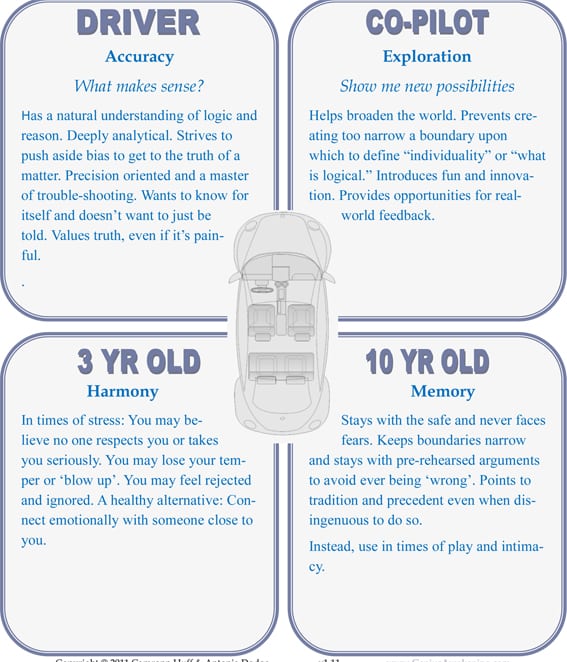
We have a philosophy at Personality Hacker that each of the Myers-Briggs types is imperative to the social ecosystem. Like an orchestra that requires every musician, we all bring something that the world needs.
Depending upon the time period in history and the culture of any particular location, the niche our personality type fills may be celebrated or demonized.
Since our self-esteem can’t help but be influenced by the world’s feedback some of us can take it rather personally, especially if we fall in the ‘demonized’ category. Keeping that in mind, let’s talk about INTPs.
The INTP Personality Type
To get inside the experience of an INTP it’s important to acknowledge how they enter the world and how the world responds back.
 In our car model, an INTP’s Driver is Accuracy, technically called Introverted Thinking.
In our car model, an INTP’s Driver is Accuracy, technically called Introverted Thinking.
Accuracy is the part of us that asks, “Does this make sense?” It scans for incongruities and/or when information doesn’t add up. It seeks truth without judgment.
If you’re mistaken and an Accuracy person corrects you, it’s not personal. They honestly would want that information themselves and so they expect you want it, too.
The Co-Pilot process is Exploration. Its technical name is Extraverted iNtuition.
Exploration figuratively rolls up its sleeves and engages with the environment, exploring the world and understanding new patterns.
Some of this can be done conceptually, reading about new ideas and concepts. But the highest quality Exploration is done when the person is experiencing something novel to them and getting out of their comfort zone.
Accuracy combined with Exploration creates a zoom-in/zoom-out dynamic with information. Accuracy zooms way in to see all the moving parts of a system (whether conceptual or mechanical) and master how they interrelate with each other. Exploration zooms out to take in a much bigger picture and determine if the system fits into the larger meta-system.
Sometimes complete mastery of an idea or subject leads to erroneous conclusions if there is no cross-pollination with other disciplines. Exploration helps keep an INTP from too much subject myopia. It also encourages a test/iterate process, a necessary tool in vetting hypothesis.
This results in identifying holes in logic, seeing how concepts break down and then playing with other concepts.
For an INTP ideas are like Legos with an infinite number of combinations, though some constructions are clearly superior to others. If you tell an INTP your belief system, their talent is to spot all the strengths and weaknesses in the design.
This hasn’t always gone well for INTPs.
INTPs have historically been in a precarious situation. They offer to the world a healthy dose of radical honesty by questioning the status quo and the accepted belief systems of the time. That’s a tall order. We get pretty attached to our belief systems and we’re none too friendly to people who try to take them from us.
Not that an INTP is trying to take anything from anyone, they’re merely observing what seems obvious to them. Or maybe questioning what seems obvious to everyone else, but makes no sense to the INTP. In times past, merely suggesting anything other than the status quo could get you a hemlock cocktail for your troubles.
Please don’t think I’m implying that all INTPs are “know-it-alls” or even that their own logic is always sound. In fact, the more developed an INTP gets the less they assume they know everything and the more they’re open to being wrong. But woven into the fabric of an INTP mind is a talent for formal logic, and if they pursue the skill they can outclass just about everyone else. It is, after all, what they bring to the ecosystem.
 When an INTP is allowed to be themselves without punishment there is a real sense of childlike wonder for the world. There are so many possibilities and so many delightful puzzles to solve.
When an INTP is allowed to be themselves without punishment there is a real sense of childlike wonder for the world. There are so many possibilities and so many delightful puzzles to solve.
Even if an INTP ends up with more questions than answers, that’s okay. At least they had the opportunity to ask them! There’s no desire to hurt anyone, only a desire to know.
To an INTP, all thoughts and belief systems are subject to change as information is collected and evidence mounts. To attach to an idea means losing your edge.
I’ve seen an INTP argue vehemently for a position only to hear a piece of data that had them completely restructure their thoughts in real time. With eyes widening in understanding and pausing long enough for all the data points to switch around internally, it was as if a piece of the puzzle they didn’t know was missing finally presented itself.
There was no ego to it. No “you won, I lost.” There was only gratitude at getting one step closer to truth.
INTPs and Respect
Show an INTP that not only do you know your stuff but that you have novel new patterns to share and you’ll gain an instant fan. It’s so delightful to an INTP to find someone who knows more than they do in any field that interests them. Even if they graduate beyond you, there will always be a sense of appreciation for the part you played in their lives.
Unfortunately, not all of us hold so loosely to our beliefs and ideas. In fact, most people will only let you pry their paradigm from their cold, dead hands.
We call it having our faith ‘shaken’ and it can be devastating, some of the most real pain a person will ever experience in their lives. INTPs can also experience a “shakening,” but for the INTP there’s a powerful intrinsic reward for rooting out dissonance.
Other types can also gain rewards for getting closer to their subjective truth, but not nearly on the same level. So INTPs take the plunge for us.
We love and hate them for this, celebrating them as characters in TV shows and movies but resenting them when they’re debating the ever living hell out of our arguments in real life.
Our fickleness takes a real toll on them. We mistake their digital approach as robotic and we forget just how much our responses can hurt their feelings. If you continually presented gifts to other people and they continually rejected them it would be easy to question the value of your gifts.
Most of us conflate our beliefs with our identity. An INTP gives the gift of challenging that identity and those beliefs. They challenge people to question who they are at the core.
It’s not that the gift of radical honesty is without value, it’s that most of us aren’t ready for that kind of gift. When we are ready, though, it’s invaluable.
INTPs are powerful. When at the top of their game they can alter how entire societies see reality. While we can’t know their types for a certainty, there’s a lot of yammering about Einstein and Socrates being INTPs. We now experience reality differently because of the thoughts of these men.
On the flip side, when an INTP is suffering they can bring a powerfully toxic element. Without rigorous intellectual honesty the gifts of an INTP can become a weapon, hurting others as they themselves hurt.
The more an INTP gets into their Co-Pilot process of Exploration, however, the more they see how to present their ideas in a way that doesn’t immediately turn others off.
Intellectual dog piling, while seductive, is the least effective way to persuade another person. But comedy, formal debate, scientific research and technological advancements… these are all extremely influential. When an INTP experiences enough of life to gain clarity on what means something to them and goes for it they can be truly unstoppable.
A Word on Motivation
Many INTPs struggle with being motivated to do anything. This can come from being repeatedly ‘knocked down’ by other people in their lives, or it can simply be from seeing the absurdities of life. Self-discipline can be difficult to develop, though it’s just a skill like any other.
The easiest way to develop self-discipline is to ask yourself which problems are most interesting to you to solve and go after them like a juggernaut. When you’ve discovered the answer for yourself, do what you can to share the solution with other people.
Sharing your discoveries with others requires you to pick up all sorts of skills, including the art of persuasion. Stay focused and on track.
When you’re really into something you can focus on it like it’s the only thing in the world. Choose something that fascinates you, is a challenge to be solved, and continue to develop enough compassion to bring your findings to the world. That is the seed of motivation.
If an INTP shows up cynical and in pain, always needing to be right and self-protective, they can shut off their compassion mechanisms. They retreat to their 10 Year Old process of Introverted Sensing, or what we call “Memory.”
Memory’s greatest desire is to feel safe, and when done well people who favor this function ensure that we’re all going to be okay. But it does so by finding a status quo, the very thing that most INTPs are accused of trying to compromise. So how does this work?
The INTP finds their own ‘sweet spot’ of safety, their own individualized status quo to which others must conform. Massive Multiplayer Online games showcase this kind of society, as does the seedier places of the net like 4chan, where insulting each other’s mother is foundational.
It’s both hilarious and horrifying, and while (as an ENTP) I can find the hilarity, it’s pretty clear that these are not the healthiest examples of any type.
When an INTP loses their compassion it’s done out of cynicism, a fear that they (and their gifts) will never be acceptable.
Since their 3 Year Old process is Extraverted Feeling, or what we call “Harmony,” they actually have an easier time of pretending they don’t care what others think of them. Any pain of rejection is easy to compartmentalize, with a mistaken belief that it’s been handled. There’s a sense of, “Fuck you, I’m making my own rules
This may be fine for a time, and by ‘for a time’ I mean up to many decades for the INTP. But there’s no real sense of meaning or purpose, and their inner wisdom can’t help but scream they’re bullshitting themselves.
In the midst of cognitive dissonance, ultimately the INTP turns on themselves like a starving animal eating its own tail. It’s not sustainable.
Destruction to Make Way for Creation
I liken INTPs to the intellectual version of Shiva, the great Hindu god of destruction. Shiva destroys to make ready for new creation, like a brush fire removes dead wood and prepares the soil for new growth.
Nobody really likes Shiva when he’s in full destruction mode, but without the service there would only be stagnation and ultimately doom.
In a similar vein, nobody really likes to have their long-held beliefs questioned. But without the service we would stagnate in every technology: social, evolutionary, paradigmatic, and gadgetry.
A lot of our pain lives in our 3 Year Old process since it’s also our blind spot.
For most people the struggles of companionship, connection and contribution are solved using the Harmony process, even if it’s not a function in their ‘car’. But for an INTP the need to connect with others can sneak up on them, even if they’re better than most at ignoring or even transmogrifying that need.
I often refer to the 3 Year Old mental process as the Aspiration. I think I picked this up from Linda Berens, or maybe even Dario Nardi. Regardless, the theory is that we experience challenges that seem easy for other people to solve because they have easier access to the ‘appropriate’ cognitive function. If that function is our inferior – our 3 Year Old – we don’t have the same access because it’s our blind spot. We’re forced to come up with novel new ways of solving those same challenges using our native strengths.
It can be frustrating work. And for an INTP, figuring out how to connect with other people can be exhausting. The current world undoubtedly favors the Harmony process over Accuracy. An INTP has to figure out how to connect with other people without playing all of the social games.
I’ve observed INTPs do this through skill development that blows other people away (like Neil Peart, the drummer of the progressive rock band Rush); by owning their quirkiness unapologetically while keeping their genius (like Albert Einstein); by being hilarious (like comedian Dmitri Martin); by creating an environment they would want that helps others (like Zappos CEO Tony Hsieh); or through massive contribution (like Marie Curie).* p>
INTPs and Approval
There is a Janus-like quality around approval for an INTP. The need to be recognized for one’s work seemingly contradicts the need to be independent and set fire to the status quo. Contribution sates both desires.
 And, of course, love. An INTP in love is an adorable thing, and while they may not be the most attentive lovers in a traditional sense they can be some of the most solid. There is a sense of loyalty an INTP develops since connections are so difficult to come by. The INTP also has an admirable respect for the other person’s individuality.
And, of course, love. An INTP in love is an adorable thing, and while they may not be the most attentive lovers in a traditional sense they can be some of the most solid. There is a sense of loyalty an INTP develops since connections are so difficult to come by. The INTP also has an admirable respect for the other person’s individuality.
As mentioned before, the process of Accuracy adopts a nonjudgmental stance about information and personal truth. If you’re forthcoming with your own truth an INTP has the capacity to hold space for things that would send other people into the seventh orbit of the sun.
For people of other types, knowing they’re going to be honored as an individual without judgment can be a pretty heady thing. Full acceptance is a novel experience to a lot of people. It can be a challenge to stop playing all the emotional games we’ve been programmed to play.
If an INTP is interested in you as a person you’ve already passed their vetting processes. Once given the green light (and they sense no real danger) an INTP can develop intimacy at a surprising speed. And, again, that childlike wonder surfaces.
Friendships are extremely important to INTPs, with humor often being a cornerstone. Connecting with other people through a shared appreciation of the absurd is an easy, nonthreatening inroad. But there’s always going to be a desire to spar intellectually and play with other people. If you’re an INTP and your friendships don’t allow for a healthy amount of intellectual play it’s time to branch out and get that need met.
 Finding people of like minds is imperative. When an INTP is accepted for the gifts they bring of radical honesty, cheerful wonderment, and intellectual playfulness; when they are in a position to solve puzzles and challenges and share their findings with others; and when they accept that their gift may be socially thankless but they’re going to persevere and keep going, you see a happy and extremely healthy INTP.
Finding people of like minds is imperative. When an INTP is accepted for the gifts they bring of radical honesty, cheerful wonderment, and intellectual playfulness; when they are in a position to solve puzzles and challenges and share their findings with others; and when they accept that their gift may be socially thankless but they’re going to persevere and keep going, you see a happy and extremely healthy INTP.
And we need as many of them as we can get.
-Antonia
*With the exception of Tony Hsieh, I haven’t personally profiled any of these people, some of whom are dead. Type guesses are just that and subject to being wrong.
______
When you’re ready, here are five ways we can help you grow…
1. Reclaim Authorship of Your Life (Free Audio): Become the Main Character Your Own Life
2. Regulate your Body, Emotions, Thoughts, & Intuition with Self-Regulation Mastery
3. Understand yourself at a deeper level with a Personality Owners Manual
4. Master the Art of “Deep Reading” people in Profiler Training
5. Rewire your Brain & Build a Life that Fits You in the Personality Life Path

Share:
The Link Between Your Sexuality and Your Social Image
INTP Survey: 5 Things INTPs Wish They Had Known as Teens
90 comments
Captain Tightpants, your sentiments reflect mine. I’m also new to MBTI and personality types in general. I always thought everyone perceived and processed information the same way as me so I’ve been forever frustrated in life, never fitting in and constantly finding myself confused and in a lot of conflict with others, who simply just are not getting it right. A number of times, including on this here site, I’ve typed out as an INTJ, but this is often a frequent misdiagnosis I gather from all the info that abounds in trying to separate the two. I definitely identify with both, but I’d have to say that this is my home base. Answering the questions of Life The Universe and Everything is my life’s work, and I often regret I didn’t do a PhD in physics… though you never know… better late than never I suppose… it could still happen. I just have an aversion to maths, even though I feel like I use a mathematical scanning algorithm in all my perceptions. It has something to do with living in The Matrix and hyperspace I’m sure. Isn’t the universe supposed to be a giant brain? Or a holographic video game? I feel like it’s both and none and all possibilities and then I feel like I don’t know anything at all. What I do know is I agree with your last two sentences the most. This site is a fantastic resource and I’ve discovered in the past couple of days that ENTPs are my go-to people for inspiration. I’d really love to see Dave Asprey from Bulletproof Radio interview Antonia Dodge, because the two are both Visionary ENTPs doing the most awesome high quality work I’ve seen in a very long while and I’m curious how this interaction would play out – like the universal brain meets big bang of fresh expansive ideas, and we all get to benefit. I actually feel compelled to push for this and I’m going to start nagging both parties to form a collaborative link. I see great potential for connection there. Coaching, hacking, self-improvement, insight, entrepreneurial sprit… c’mon guys, the world needs to see this happen! You need to get this site affiliated with London Real as well. If you profit from either of these collaborations you can re-gift me with free access to premium content, and we’ll all be in a better place of expansion and growth :-)
You mean like Treebeard?
“Memory” is just a nickname for Introverted Sensing, a complex cognitive function that perceives the world in terms of matching new information to what is already known. That doesn’t mean people who have it as a strength automatically have a good memory, nor that those who have it as a weakness have a bad memory (though there are trends that direction).
Having your Exploration (Extraverted Intuition) process stifled and being encouraged to conform/take the safe textbook path is actually an expression of the Memory (Introverted Sensing) process showing up in an unhealthy way for an INTP. The encouragement is to take risks. If you feel stifled in this way you’ll definitely lose your sense of wonder and cheerfulness.
Hope that helps clarify.
A
p.s. For more information on Memory (Introverted Sensing) here are some resource:
Why Personality Hacker Uses Nicknames for the 8 Cognitive Functions: www.personalityhacker.com/nicknames-for-8-jungian-cognitive-functions
Sensing Personality Types Podcast: www.personalityhacker.com/podcast-episode-0093-sensing-personality-types
Great article! I’ve been subscribed to personalityhacker for about a year and read quite some of the articles but strangely enough, I only touched onto my own personality about now. I found most of the descriptions in this passage rather accurate – I could identify with most of it. However, what puzzled me was the Si component…I’ve had a horrible memory, bad enough to forget most of anything I read, barring the vague general concept. The whole idea of “memory” is a little strange to me in this regard, although I suspect I may have interpreted this wrongly.
Another thing that struck me was about the intp sense of wonder, something I’m afraid I have lost mostly. I live in Singapore, which is a ridiculously meritocratic country, with a heavy focus on academics. That, coupled with an ESFJ mum, probably stifled my exploration and subjective accuracy I enjoyed, in favour of comformity and “correct textbook answers”. I’ve sank into some form of intellectual isolation, pursuing my interests alone in my small pockets of free time. Generally, my friends are isfj or istj are are only interested in academic work tested in exams. I highly doubt this development is healthy…after reading philosophy, I’ve started to go into existentialism, especially the whole absurdity theory. Given how existentialism started after World War 2, I don’t think this bodes well…
Any intps had such an experience before? I identified with this piece as well as the comments after it, so I really do hope for some pointers :)
Wow, as someone who just encountered the whole concept of MBTI types a week ago, this article really relates to me and I see a lot of aspects about my personality much clearer now. Some parts read like you somehow got access to my diary and rewrote it to fit your website. Not that I have any diary in the first place, but still…
A little bit of backstory: A few days ago encountered some commend on Imgur – so I was happy to see an unexpected 4chan reference here, although I favor Imgur over 4chan – and started to get into the MBTI system. Funnily enough I did the test over at Humanmetrics.com twice (one time after I just read about the MBTI basics, and another time after comparing some of the types). I came out both times as INTJ but I feel a much closer relation to the INTP type as you describe it here. But the test resulted only in a slight preference of P over J, so I guess it makes sense and after all, this online test just could be inaccurate. The tests also showed a strong inclination to the I type and medium preferences to NT, which seems about right.
As I said, I relate to pretty much every detail from your text. For example the zoom-in/out dynamic from accuracy/exploration: I like to get involved into details, and surely could be called a perfectionist, but I also love to see the big picture. The question of life, the universe, and everything so to say. This is also where a lot of the childlike wonder comes into place. I’m a physicst currently doing my PhD, and physics always fascinates me, but over time I managed a strong appreciation for other topics like biology (evolution – there’s the “big picture” I was talking about!) or even history. (The beginning of civilization in ancient Mesopotamia? Yes I’d like to know more!)
I often feel slightly(?) misunderstood in some way as I’m having a hard time finding, or even defining, my place in society. And this comes from someone who almost never talks about his inner feelings, so my comment here is kind of a unique situation ;) I guess it has a lot to do with the longing to find an objective truth, without ego involved, even when discussing personal matters with others. Like you wrote, it’s almost never about “who’s right” for me but about the objective-as-possible answer to the question we’re discussing. I have the feeling others might not see it in the same way as I do… This is something which I had in some way realized before by myself, but this article brings some clarity to the way I perceive my interactions with other people. If I try to boil it all down, I’d say that it never occured to me that others might have completely different processes of thinking and perception, and in my mind it was always clear how to process new ideas.
The section about approval is also spot-on. I respect everyone I know as an individual and always try to see others without prejudice. Of course there are people I just don’t like, but even for those there’s some base level of respect unless they really, really fucked up. In which case I do my best to ignore them and get on with my own life. As you can imagine I have a really small circle of close friends. With one of them (also physicist) I tend to discuss any new idea I have encountered, like this MBTI thing. Actually this friend is the only one up to now who I talked to about the MBTI and my newly encountered personality type. (The response was that the MBTI system is seen as scientifically inaccurate – which might be true or not, but it doesn’t stop me from gathering the concepts about different personalities). I have a strong sense of respect for this friend who is very like-minded and probably more intelligent than me. You included a well-put sentence in your article about the “desire to spar intellectually and play with other people” and this couldn’t be more true. I’d never thought how important this could be until I encountered said friend, with whom I like to discuss all the things which truly interest me, especially the “big picture” ones.
This has become a really long comment and as I mentioned, I seldomly talk about myself. It actually feels quite good to do this, although it’s also a bit weird for me. So what’s left to say? Of course, thank you for this well-written article which already helped me a lot to appreciate my personality, and for this whole website in general. You are definitely helping people develop their characters and finding their place in society!